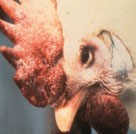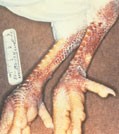What to look for
Avian influenza mainly spreads between birds, but can also infect other species including humans and pigs. In birds, clinical disease is usually only seen in poultry (for example chickens and turkeys).
Mild case:
- coughing, sneezing, watery eyes, lack of appetite, ruffled feathers, fever, weakness and staggering
- combs and wattles may look swollen, enlarged and discoloured (purple or blue)
- hens may lay soft-shelled eggs before ceasing to lay.
Severe case:
- sudden death of a large number of birds.

Swelling of combs and wattles

Weakness and staggering

Birds with swollen heads

Bleeding in the legs
What you can do
Do not move live animals or poultry products, including eggs, feathers with skin still attached, meat, skins or carcasses out of the Torres Strait Protected Zone to the Torres Strait Permanent Biosecurity Monitoring Zone, or from either zone to mainland Australia without a permit and an inspection by a Department of Agriculture and Water Resources biosecurity officer.
- Report any signs of illness or death in birds to the Emergency Animal Disease Hotline on 1800 675 888.
- Do not let domestic and wild birds come into direct contact and don’t use the same equipment for treating wild and domestic birds.
![]()

Live animals and poultry products, including eggs and feathers with skin still attached need a permit to move south between zones and to mainland Australia
Profile
Bird flu (or avian influenza) is a highly contagious disease affecting several species (mainly birds). It is caused by a virus, some strains of which are highly lethal and others milder. The virus can mutate, meaning a mild strain could suddenly change to cause much more serious disease. These mutations also mean vaccination is often not possible or effective. Some wild birds can carry and spread the virus without showing signs of disease. Domestic poultry, especially chickens are often more susceptible than other birds.
Harmful strains of the disease which have occurred in Asia in recent years could devastate the poultry industry if they got into Australia. A harmful strain of bird flu could be carried into Australia in illegal imports of live birds, eggs or bird products. Alternatively, a harmless strain that is already present in wild or migrating birds may mutate to become harmful for domestic poultry. Once disease occurs in poultry, spread can be very rapid.
Identification
The signs of bird flu vary depending on the strain of virus. In milder forms, hens may lay soft-shelled eggs before ceasing to lay. Some birds may show a combination of coughing, sneezing, watery eyes, lack of appetite, ruffled feathers, fever, weakness and staggering. In more severe cases death is often very sudden. Birds often appear drowsy with their heads touching the ground. Combs and wattles may be swollen and discoloured (purple or blue). The most severe forms cause sudden death of a large number of birds. Veterinary examination and laboratory tests are required to distinguish bird flu from other diseases. Bird flu can also infect humans, causing mild to severe respiratory illness and sometimes death. The sick, young and elderly are usually the worst affected.
Distribution
The virus occurs worldwide. The disease is more likely to infect flocks that are not managed with stringent biosecurity practices that include good hygiene and strict isolation from wild birds. In Australia, severe forms of the disease have occasionally occurred in commercial flocks.
Threat
The disease could severely damage Australia’s broiler and layer industries. Response requires slaughter of infected flocks and those nearby, sometimes resulting in massive losses. Bird flu is also a major public health risk. Infection in people usually occurs after close contact with sick or dead birds, but the virus can sometimes be spread directly from person to person, depending on the strain.
Keep a Top Watch!
Imports of live birds, eggs and bird products are not permitted except under strict conditions. Keep a watch on wild and domestic birds and if you see sick birds or more deaths than usual, call the Emergency Animal Disease Hotline on 1800 675 888.
For any suspicious movements or illegal imports of birds, bird products, feathers or eggs from overseas contact NAQS.
For further information or advice contact NAQS.
